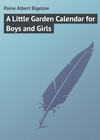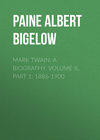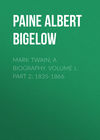Читать книгу: «A Little Garden Calendar for Boys and Girls», страница 6
III
THE SUN IS THE GREATEST OF ALL CHEMISTS
It was about a week later, that one afternoon little Prue and Davy and the Chief Gardener were helping big Prue with her roses, and admiring all the different kinds. Little Prue had been thinking a good deal about roses since the story of the Princess Beautiful, and wondering just which of the climbing red ones had grown about her grave. Then she began to wonder about all the kinds, and how they came. She spoke about this now, as her mamma pointed out one which she said was a new rose – just offered for sale that year.
"Where did it come from?" asked the little girl, "where do new roses come from?"
"From seed," answered the Chief Gardener, "like the new peaches and apples I told you of. Roses belong to the same family, you know, and they are grafted much in the same way. Then the seeds are planted, and from these, fine new kinds are likely to come. Rose-growers are always trying hard to make new kinds by mixing the pollen. The pollen, you remember, is the yellow powder on the little tips of the stamens. These tips, as I believe I told you, are called anthers, and the slender part of the stamen is the filament. It is the pollen falling from the anthers upon the single green stem or pistil in the center of the flower that produces the seed. The pistil is divided in parts, too. The little top piece is called the stigma, and the slender green stem is called the style. The pollen falls on the stigma and is drawn down through the style to give life to the seed-pod below."
The Chief Gardener picked the bloom of a single bramble rose and pulled it apart to show the children all these things.
"Now," he went on, "gardeners often take a rose of one kind and color and shake it gently over a rose of another kind and color, so that the pollen will fall from the anthers of one upon the stigma of the other. In this way the seeds are mixed and it may happen that wonderful new roses come from those seeds. Sometimes, instead of shaking the rose, the gardener carefully takes up the pollen on a tiny soft brush and lays it gently on the stigma of the other rose, all of which has to be done as soon as the bloom is open. Of course, such roses are kept to themselves, and labeled, and the seeds are carefully labeled also."
Davy and Prue were both interested.
"Oh, can I make some new kinds of roses," asked little Prue, greatly excited. "Can I, Mamma?"
"You may try, but I am afraid you will not be very successful where all the roses are out here in the open air. Still, it will do no harm to see what will happen, and you might get something very wonderful."
"I am already trying for a new kind of peach," said Davy.
"And if you get a good one we will call it the 'Early David,'" laughed the Chief Gardener.
"And what will you call my rose?"
"Why, 'the Princess Prue,' of course."
"Do seeds from the same bush make the different roses?" asked Davy.
"Yes, and from the same pod."
"But are the seeds just alike?"
"They are so far as anybody can see, but when they come to grow and bloom, one may be a white rose, another pink, and another red. Some may be dwarfs in size, and others giants. All may have the same sun, the same water, the same air, and the same soil. It is only the tiny little difference which we cannot see that makes the great difference in the plant, by and by."
Davy was thinking very hard. Soon he said:
"And where do sweet and sour and all the pepper and mustard and horseradish tastes come from? The air and the water don't taste. I never tasted much dirt, but I don't believe any of it would bite like a red pepper."
The Chief Gardener laughed.
"No, Davy, I don't believe it would," he said. "And I think the sun is the only one who could answer your question. It is a chemistry which no one of this world has been able to explain. Chemistry is a magic which you will understand by and by, and you will know then that the sun is the greatest of all chemists. Suppose we go down into your gardens and see what he is doing there."
They all went down the little steps that led to the Chief Gardener's enclosure, where Prue and Davy had their gardens, side by side with his. There just as they entered was a great mass of morning-glory vines that every morning were covered with a splendor of purple, and pink, and white, and blue, and just beyond these was a mass of dianthus pinks of every hue and shade. Bachelor-buttons, petunias, and verbenas were all there, too, besides Prue's sweet-pease by the fence, and her alyssum and mignonette. Then came Davy's things, all fresh and growing, and beyond these the Chief Gardener had ever so many things, from beets to beans, from parsley to parsnips, from carrots to corn. In one small corner by the strawberry-bed there grew a little bed of pepper plants, and near-by a row of tomatoes. The Chief Gardener stopped in the midst of all these things.
"Here is the sun's chemistry," he said. "We put some tiny bits of life in the ground. The same earth holds them, the same rain wets them, the same air is above them. Then the sun shines, and with that earth and water and air and that tiny seed, it makes something different of its own. Of one it makes a flower, of another a fruit, and of another a vegetable. Of the flowers it makes many kinds and colors – of the fruits and vegetables it makes many shapes and flavors. The sweet red strawberry and the fiery red pepper grow side by side. It makes food of the roots of the beet, and the parsnip, and carrot, and of the seed of the bean, and of the corn. It fills the mustard, and the horseradish, and the pepper, with a flavor so that we may season our meats and soups, and it gives to thyme, and marjoram, and fennel, a sweet savor that is like an odor of by-gone days. Into the flowers it pours the color and perfume that make them delicious and beautiful, and into the fruit and vegetables the starch and phosphates that make them pleasant to the taste and nourishing to our bodies. Where do all these things come from? We do not see the colors, or smell the perfumes, or taste the sweet and the sour and the bitter in the air and water, and we could not see, or smell, or taste, them in the earth. Yet they must be there, and only the sun knows just how and where to find them, and how to make the best use of them for the world's good, and comfort, and happiness. Without the sun the earth would be bare and cold, and there would be no life – at least, not such life as we know. Every breath we draw, every bite we eat, every step we take, every article of clothing we wear, comes to us through the sun."
"Papa, we can see the sun's colors," said Davy. "When it shines through the cut-glass berry-dish it makes all its colors on the table-cloth."
"So it does, Davy, I didn't remember that. A glass prism shows us all the colors in the sunlight, and these are the colors that it puts into the flowers and fruit – just how, I am afraid we shall never know, though like all great wonders, I suppose, it is really a very simple thing. When plants grow without sunlight, they grow without color, and it is the same with little boys and girls. Open air, sunlight, fresh water, and good food – these are what make plants and people strong and happy and beautiful."
And so June passed and half the year was gone. Prue and Davy were brown from working and playing out of doors, and were growing so fast that Davy said it was hard for his corn to keep up with him. They took great pride in the flowers and vegetables that came to the table from their gardens and always wanted them in separate dishes from those that came from the larger garden. When any of their friends came to dine with them, it was Prue's flowers that were to be worn and Davy's vegetables that were first to be served. By the end of June some of the early things were gone, and had been replanted. Other things had grown so big that they were beginning to crowd in their rows and beds, so that by the first of July, the little gardens that grew side by side, and could be seen like a picture through the windows where the winter gardens had been, reminding little Prue of Alice's garden in Wonderland, had become almost a wonderland jungle.
JULY
I
A PLANT IS DIVIDED INTO THREE PRINCIPAL PARTS
"CLASS in botany will please rise."
Davy and Prue looked up quickly from their little corner by the peach-tree. It was a warm day, and they were resting in what they called their "house," because it was a shut-in nook behind the corn, and with tall sunflowers on the other side. Just now when the Chief Gardener came upon them they were pulling some flowers to pieces and talking about them very earnestly.
"Class in botany please rise," he said again, taking a seat himself on a bench close by.
"But I can't – it's too warm," said little Prue, "and besides I've got my lap full of flowers."
"Can't the class in botany sit by the teacher?" asked Davy.
The teacher moved over. Prue gathered her dress into an apron, and presently the children were perched one on each side of the Chief Gardener, who fanned himself with his straw hat, for it was a real July day.
"We've been seeing how many of the parts of a plant we knew," said Davy. "We know all the parts, I guess, but of some plants we can't tell which are which."
"Suppose you name the parts for me," said the Chief Gardener.
"Oh, let me! Let me!" began Prue. "I asked first!"
Davy looked a little disappointed, but waited.
"Very well, suppose you try, Prue."
The little maid was excited.
"Why – why, there's the c'roller and the calyx and the pistil and the panthers, and – "
The Chief Gardener laughed in spite of himself, and Davy looked rather shocked.
"She always calls the anthers 'panthers,'" he said, sorrowfully, "and she never will say 'corolla' right."
"And those are not the parts of a plant either," added the Chief Gardener, "but the parts of a flower. A plant is divided into three principal parts. Now, Davy, it's your turn. See if you can tell me what they are."
"Well," began Davy, "the root is one."
"The root is one, Davy; quite right. Now for the others."
"The leaves are another."
"The leaves, yes, the leaves are another."
"And the flower makes three, doesn't it? But then there's the stalk, too. That makes four. There must be four parts."
"There are a great many parts," nodded the Chief Gardener, "but there are only three principal parts – the root, the stem, and the leaf. To a botanist – one who studies plants and how they grow – the flower is only a branch of the stem, and its parts are leaves."
"I suppose that is why rose-petals are called leaves," said little Prue.
"I think it is."
"But – but don't you think a flower ought to be a principal part?" asked Davy.
"Well, it is in a way. It is a particular kind of a principal part, made for a special purpose. But after all, it is really a branch, for it comes from a bud, just as other branches do, and it comes just where any branch would come. Many times you cannot tell whether a bud is going to make a flower or just leaves until it opens. And there are a few queer flowers in the world that can hardly be told from leaves even after they do open."
II
THERE ARE EXOGENS AND ENDOGENS
"Now let us tell the parts of a flower. That was what we were doing when you came up," said Davy.
"And let me tell again," said little Prue. "I know I can get them right, this time."
So little Prue told again, and got it almost right, though she did call anthers "panthers" again, just as the first time.
"Now, Davy, it's your turn," said the Chief Gardener.
Davy picked up a little pink flower which he had found in the grass. It was oxalis, or sorrel, and sometimes the children nibbled the sour leaves, calling it sour-grass. Of course, you must not forget that Davy was older than Prue, and perhaps a little more thoughtful.
"This," he began, picking off the little green flower-casing, "is the calyx, and each little piece is called a sepal. This flower has five sepals in its calyx, and five petals in its corolla. These are the petals," and he pulled out the little pink flower-leaves, and laid them by the green sepals. Then he held it up for the Chief Gardener and little Prue to see.
"Look at the stamens," he said. "They all grow together at the bottom."
"That's because your sorrel is a Monadelphian," said the Chief Gardener.
Davy looked puzzled.
"I know what a Philadelphian is," said Prue.
Davy laughed.
"The words are very much alike," smiled the Chief Gardener. "They both mean brotherhood, and come from some old Greek words. Philadelphia means brotherly love, and Monadelphia means brotherly union. You see those stamens are all brothers and are joined together as one. All plants with such stamens are called Monadelphians."
"A stamen has three parts," Davy went on, "its filament, its anther, and its pollen. The filament is the stem, the anther is its cap, and the pollen is the dust which falls on the pistil and helps to make the seed."
Very carefully Davy took away the ring of stamens, and left only the little yellowish-green center of the sorrel flower.
"This is where we get the seed," he said, as gravely as an old college professor lecturing to a class. "This is the pistil, and it has three parts, too: the pod, the style, and the stigma. The stigma is the little piece at the top which catches the pollen from the anthers. The style is the stem, and the pod is the big part below which holds the seeds."
He held up the little stripped flower again. "This pistil has five styles and five stigmas," he went on. "A good many flowers have more than one. It has ten stamens, too – two stamens for each style, and five petals and five sepals. You can divide it by five all the way through."
"Even to the seed-pod," added the Chief Gardener. "It has five divisions," and he cut the tiny green pulp and showed them with his magnifying-glass. "The little sorrel flower is one of the most perfect of flowers – one of the most perfect in a great class of flowers called Ex-o-gens. There is one other class called End-o-gens. Those words are from the Greek, too. Exogen means outward-growing. Endogen means inward-growing. The stem of an Exogen grows by layers, as most trees grow."
"Oh, yes," said Prue, "I know. We counted the rings on that big oak that was cut down over by the lake last year. It had one ring for each year."
"That's right, Prue, and the stem of the Endogen grows inside a shell, and is often just a soft pith, like the inside of a cornstalk. These are the two great classes of all flowering plants and trees. You can always tell the difference by their stems; nearly always from their leaves; always from their seeds, if you have a strong magnifying-glass, for the little germ of the Exogen has two leaves like the morning-glory, and the germ of the Endogen has but one like the lily, or corn. But the easiest way for you to tell is by the flowers. An Exogen flower nearly always goes by fives, like the little sorrel bloom, sometimes by fours, but hardly ever by threes. The Endogen flower is nearly always divided in threes, like the lily, which has six petals. It very seldom has four parts, and never five. So, you see, we know right away that the sorrel and the rose and buttercup are Exogens, and that the lily and the hyacinth and the daffodil are Endogens. Of course, there are many flowers not so easy to place as these, and I am afraid I am giving you too hard a lesson for one time, especially for such a hot day."
"But I'm not hot now," said Davy. "There's a fine breeze, and I like to sit here and talk." So they talked on about the different kinds and classes of plants, and by and by when big Prue found them, little Prue had much to tell her about all the new things she had learned. And she was careful not to pronounce anything wrong, and to explain that an Exogen was a plant that grew on the outside, and that an Endogen was another plant that grew on the inside, and big Prue said that Davy must be an Exogen, because he was getting so fat, and that little Prue must be an Endogen, because she was growing so smart. Then everything had to be told over, and then it was tea-time, with a dainty table all spread under the arbor, and delicious raspberries, and very, very delicious ice-cream.
III
I DON'T SEE WHAT WEEDS ARE FOR, ANYWAY
And the very next day was Fourth of July, with all the fire-crackers and torpedoes and sky-rockets that always come on that day.
But there was something else. For when big Prue and the Chief Gardener come to the breakfast-table, they found that Davy and little Prue had arranged what Prue called a "susprise." The room was all red, white, and blue – not with flags or bunting, but with flowers.
There were bowls of red and white and blue morning-glories on the sideboard, and in the center of the table there was a very large bowl of red, white, and blue sweet-pease, so nicely arranged that each color was separate, and the whole looked like a cake of flowers cut in three equal parts. And there were other red and white and blue flowers, too, but the sweet-pea bowl in the center was the finest of all.
There was not much gardening that day, of course, for there were parades to see and music to hear, and fireworks in the evening. The Chief Gardener had brought home the fireworks, and when all the rockets had been fired and the Roman candles, he brought out something larger than the rest, and when it was lighted, it all at once turned into a great flower-pot and sent out hundreds of the most beautiful fiery flowers, such as no garden would grow, no matter how hot it was.
"That is to pay for the sus-prise you gave us this morning," said the Chief Gardener, when little Prue was through dancing and squealing and jumping up and down with delight. "They grew in that hot sun yesterday."
But little Prue didn't believe it, though she did ask if some of the stars which came out of the rockets didn't stay in the sky with the other stars. She was quite certain she had never seen so many in the sky before.
July was a great month in the little gardens. Almost everything bloomed and bore. The pinks, the pansies, the alyssum, the sweet-williams and the morning-glories – they grew and then bloomed and crowded each other in their beds until some of them had to be moved into new places, while as for Davy's things, his corn grew taller and taller, until it shaded his tomato vines, and he was afraid they would not do well for want of sun. But the sun was up so high, and was so hot in July, that perhaps they got enough anyway, for they grew so big they had to be tied up, and the tomatoes on them were so large that Davy thought one was almost enough for a whole family. As for his beans – well, Davy will plant fewer beans next year. They began to bear just a little at first, and then, all at once, there were beans enough on his few hills, not only for himself and Prue, but for the rest of the family, and then for the neighbors, too. Davy picked nearly all one hot afternoon to keep up with his bean crop, and then nearly trotted his fat legs off carrying little baskets to the different people that he knew, explaining to each that these were really from his own garden – his own beans that he had planted and tended himself. Then he and Prue carried some vegetables and flowers to a little hospital not far away, where there were some sick children, and some who were just getting well. And it was a happy, happy time for the little boy and girl when they took the things they had planted and cared for to the other little boys and girls who seemed so glad to have them come.
But as the weather grew warmer and summer showers came the weeds got worse and worse. Sometimes when Davy and Prue had tried very hard to get them all out and found that new ones had come almost over night, while some of the old ones they had cut down had taken root again, they were almost discouraged.
"I don't see what weeds are for anyway," Davy said one warm morning, almost crying, and little Prue, whose face was very red and hot, flung herself down in the shady peach-tree house, too tired to talk. "Now, there's that old pursley, I pull and pull and cut, and unless I carry every bit of it away, it all takes root again and grows right along as if I hadn't touched it."
"Yes," said the Chief Gardener, "it is a nuisance. I suppose its pretty sister is very much ashamed of it."
"Its sister! Why, who is its sister?" asked Davy, while little Prue sat up and forgot she was tired.
"Miss Portulaca Purslane, of course, sometimes called Rose-moss, because her flower is something like a wild rose and her stem and leaves a little like overgrown moss."
"Oh, is my sweet rose-moss just old pursley weed?" whimpered little Prue, who was very proud of a little bunch of portulaca that was just in full bloom. She had chosen the pretty flower from a catalogue, and it had been one of her best growers.
"Why, no, Prue, your rose-moss is not a weed at all, but she belongs to the Purslane family, and like a good many other families it has a member who has run wild and become a disgrace to its relatives and a trouble to everybody. There is another wild purslane, but it is not a weed. It is just a little wild-wood cousin of Portulaca. Her name is Claytonia, and she lives in pleasant places in the woods, and hides under the leaves in winter-time. Most people call her Spring-beauty."
"Oh, Spring-beauty! Oh, I know! Just bushels of them – Davy and I found over by the lake last spring! Little white flowers with pink lines in them, and smell – just a little tiny smell – so – so springy and wild. Oh, I just love Spring-beauties! But I'm sorry my nice rose-moss is pursley. Is it, Papa? Is it really a sister to that ugly weed?"
"Suppose you bring a branch of each over to the bench here – one with flowers on it."
Prue brought a sprig of her precious rose-moss, and Davy a large piece of the pursley from the pile he had just cut down. The Chief Gardener took them and put them together.
"You see, they are a good deal alike," he said, "though the leaves are different – Miss Portulaca's being the finer."
Then he took one of the tiny pursley flowers and put it under the magnifying-glass, and let the children look. Yes, it was almost exactly like the beautiful flower of the rose-moss, only smaller. Each flower had two green sepals and five colored petals, also five stamens, so they knew it was an exogen, though it would have been harder to tell this from the thick, pulpy leaves and stem. The little seed-pod of each had a tiny cap which lifted off when the seeds were ripe, leaving a perfect cup, heaping full.
"You see, children," said the Chief Gardener, "weeds do not care to be either useful or ornamental. So they become rank and common, and lose their beautiful flowers. But somehow they never have any less seed. They want to grow just as thickly as they can, and however small their flowers are, the seed-pods are always full to the brim."
"Well," said Prue, "I'm sure there can't be any of my flowers relation to chickweed. I never can get that out of my beds."
The Chief Gardener thought a minute.
"Why, yes, Prue," he said, "that's Cousin Stella; I suppose she came to see the beautiful Dian and to make her all the trouble she can."
"Oh, Papa! what do you mean by Stella and Dian?"
"Well, Stellaria is chickweed, and she's a cousin to Dianthus, your lovely pinks. I suppose you might call them Stella and Dian, for short. They are not very nearly related, but they do belong to the same family, and perhaps they were once more alike. I don't suppose beautiful Dian would own Stella, but Stella (or perhaps her weed friends call her Chick), is a great nuisance and makes Dian and her friends all the trouble she can."
"Papa," said Davy, who had been silent all this time, "are there really any plant families that don't have wild members who behave badly and become just weeds?"
"I don't remember any real weeds in the Lily family, Davy, though almost any plant will become a weed if allowed to run wild and live in fence corners, like a tramp. They become prodigals then, like the man's son in the Bible. And sometimes they come back to the garden, as the prodigal son did, to become well-behaved and useful flowers again. Of course, there are many others that have always lived wild in the woods and fields, and are not called weeds, because they do not spread and destroy other plants. These are our wild flowers, and the world would be poor, indeed, without them. Sometimes we bring them into the garden, and make them grow larger and call them by a new name. And sometimes, I am sorry to say, a sweet wild flower will suddenly spread and overrun the fields and become almost a weed. I am afraid our beautiful daisies are becoming a weed to a good many farmers. Those fields that are like banks of snow, and so beautiful to us, must worry the man who owns them and cannot get rid of the millions of 'rare Marguerites!'"
Little Prue sighed.
"Oh, dear," she said, "it's just too bad that there isn't some flower, or somebody, or something that can be just every bit good, all the time, to everybody."
The Chief Gardener smiled.
"We can only do our very best," he said.
Покупайте книги и получайте бонусы в Литрес, Читай-городе и Буквоеде.
Участвовать в бонусной программе




















